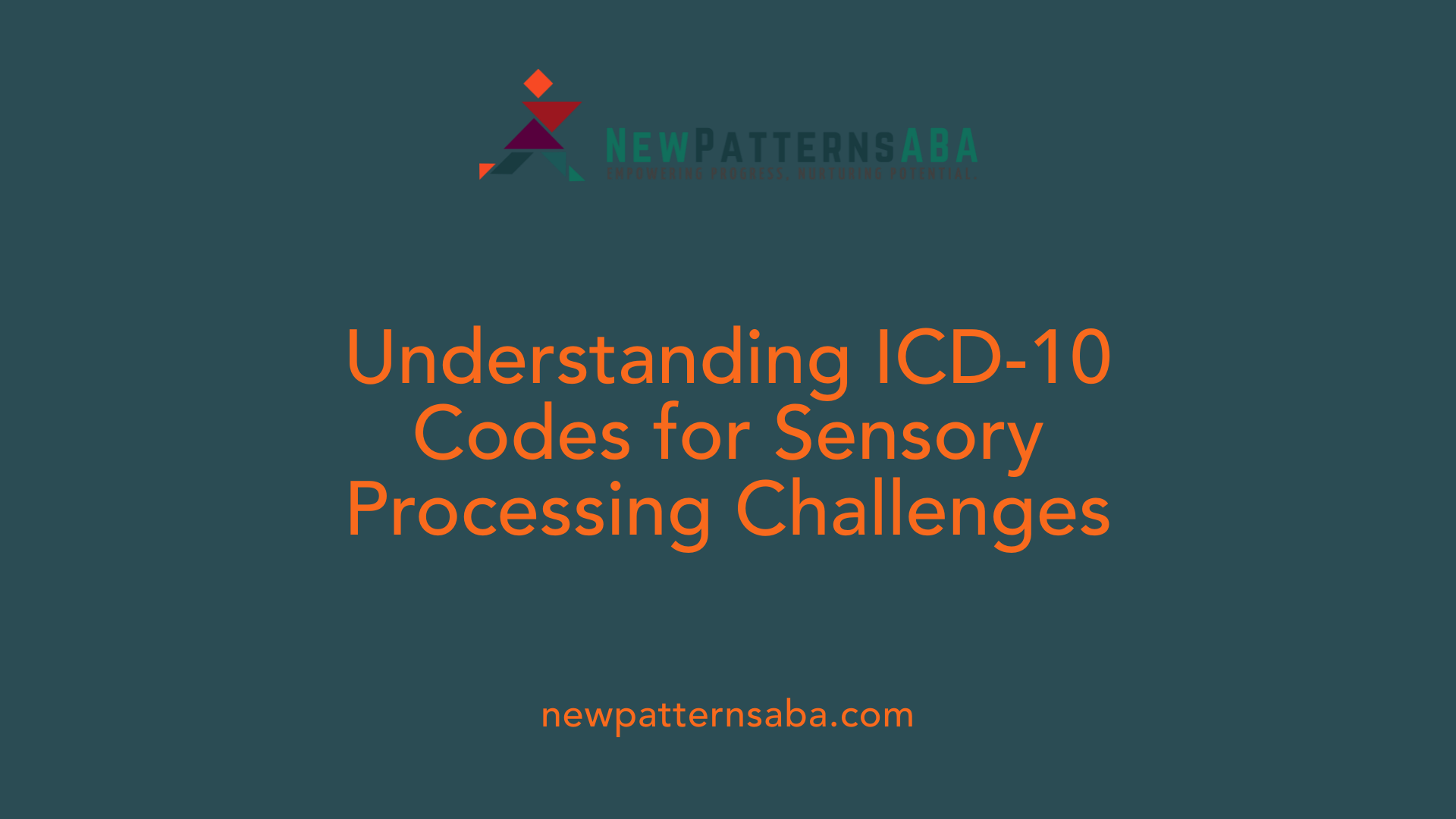The Importance of Accurate Coding for SPD
Sensory Processing Disorder (SPD) is a complex neurodevelopmental condition that affects how individuals perceive and respond to sensory stimuli. Accurate classification and coding within the International Classification of Diseases, Tenth Revision (ICD-10), are vital for diagnosis, treatment, insurance claims, and research. However, SPD does not have a dedicated ICD-10 code, leading healthcare providers to use broader or related diagnostic categories for documentation.
ICD-10 Codes Associated with Sensory Processing Issues

Does Sensory Processing Disorder (SPD) have a specific ICD-10 code?
Currently, Sensory Processing Disorder (SPD) does not have a dedicated ICD-10 code. Healthcare providers often use the code F88, which encompasses "other disorders of psychological development," to classify sensory processing problems. In some cases, clinicians may also assign related codes such as F84.9 for pervasive developmental disorder when sensory issues are present but do not meet criteria for a specific diagnosis. Additional codes like R20.3 for hyperesthesia (increased sensory sensitivity) or R43.1 for smell sensory disturbances might be used depending on the patient's symptoms. The absence of a unique code means SPD is typically documented under broader categories. Correct coding is essential for treatment planning, insurance billing, and research purposes.
How is Sensory Processing Disorder categorized within the ICD-10 system?
SPD is not explicitly classified as a standalone diagnosis within ICD-10. Instead, it is generally grouped under the code F88, which covers "other disorders of psychological development." This classification includes various neurodevelopmental conditions involving sensory and motor domains. Sometimes, related symptoms such as hyperesthesia can be coded with R20.3, and motor coordination issues might fall under F82. It is important to clarify that ICD-10 does not have a specific diagnosis solely for SPD. In upcoming revisions, such as ICD-11, more precise categorizations for neurodevelopmental and sensory disorders are being developed.
What is the significance of a diagnostic code for sensory processing disorders in ICD-10?
Assigning an ICD-10 code to sensory processing issues plays a vital role in standardizing diagnoses, facilitating communication among healthcare providers, and ensuring proper treatment. Since SPD lacks a dedicated code, practitioners often select broader categories like F88 or F84.9 to reflect the patient's condition accurately. These codes support insurance reimbursement and enable data collection for epidemiological studies, which can inform healthcare policies and resource allocation. Using consistent coding practices also aids in tracking prevalence and understanding the scope of sensory-related developmental challenges.
Why is there no specific ICD-10 code for SPD?
The primary reason no specific ICD-10 code exists for SPD is that it is not officially recognized as a distinct diagnostic entity within the system. Instead, it overlaps with other diagnoses such as autism spectrum disorder (ASD), ADHD, or general sensory processing problems, which have their own codes. Moreover, the diagnostic criteria for SPD are still debated among clinicians, which impedes its inclusion as a separate entity in ICD classifications. While clinicians can document sensory issues using related codes, the lack of a dedicated diagnostic code reflects the ongoing need for consensus and research to establish SPD as a formal diagnosis.
The Role of ICD-10 in Medical Documentation and Insurance

What is the significance of a diagnostic code for sensory processing disorders in ICD-10?
The significance of a diagnostic code for sensory processing disorders (SPD) in ICD-10 lies in facilitating standardized documentation and communication among healthcare providers. Proper coding improves consistency in diagnosis and treatment planning across different clinics and providers. Since there is no single, dedicated ICD-10 code exclusively for SPD, clinicians often use related codes such as F88 (Other Disorders of Psychological Development) or F84.9 (Pervasive Developmental Disorder, Unspecified) to represent sensory processing issues when appropriate. These codes help accurately reflect the patient's condition, which is crucial for clinical care.
Furthermore, ICD-10 codes play a vital role in insurance billing and reimbursement processes, ensuring that patients gain access to necessary therapies and support services. Accurate coding also allows for data collection and epidemiological research, aiding in understanding the prevalence, patterns, and outcomes of SPD and other neurodevelopmental disorders. Overall, proper classification supports not only individual patient management but also broader health policy and research efforts.
Navigating the Challenges and Looking Ahead
While the ICD-10 does not currently recognize Sensory Processing Disorder as a standalone diagnosis with a specific code, understanding how it is categorized and documented is crucial for clinicians, researchers, and patients alike. The use of broader codes such as F88 and F84.9 allows for essential clinical documentation, supports insurance claims, and contributes to epidemiological data. As awareness of SPD grows and diagnostic criteria evolve, future revisions like ICD-11 are expected to include more specific classifications, which will enhance diagnosis, treatment, and research efforts. Until then, accurate and thoughtful coding remains vital in managing sensory processing issues within the current medical classification framework.
References
- What is the Sensory Processing Disorder ICD-10 Code?
- Sensory Processing Disorder - ICD-10 Documentation Guidelines
- Sensory Integration Disorder - ICD-10 Documentation Guidelines
- What is the Sensory Processing Disorder ICD-10 Code?
- Sensory processing disorder - TheraPlatform
- Physician Resources - Ohana OT Pediatric Therapy in Wenatchee
- What is the Sensory Processing Disorder ICD-10 Code?
- Sensory processing disorder - TheraPlatform





